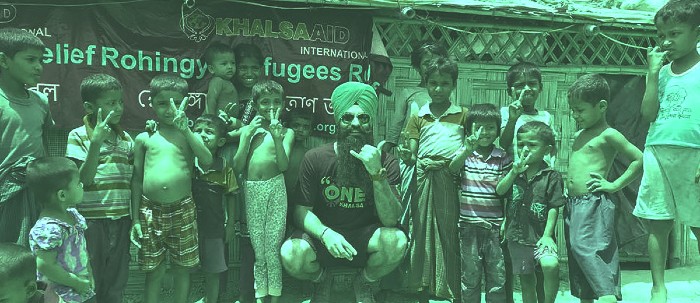Jeevanjyot Singh, a resident of Jammu, is a 27-year-old mechanical engineer. He is a project manager in a construction company. A combative worker is hiding behind his smiling face. He is ready to help the people suffering from accidents and disasters. Whenever humanitarian assistance is needed, Singh remains there. He takes leave from his work and reaches out of his home state to help people.
Recently, Singh returned to Bangladesh refugee camp after serving for two weeks. Along with other activists, he prepared and distributed food for hundreds of Rohingya refugees. Singh was providing this service with Khalsa Aid International. Khalsa Aid International is an NGO which helps people in disaster and war affected areas around the world. The Khalsa group also continues to provide assistance to the affected people in war-affected Syria.
Various Relief Camps
Singh is probably the only youth from Jammu and Kashmir who has traveled to Bangladesh twice as a worker. There have worked in relief camps built for Rohingya refugees. In September last year, he went to Bangladesh for the first time as an activist with the Khalsa Ad Group. Later, some other workers from Australia and England arrived for relief work.
As a member of the Khalsa Aid Camp, he was given the responsibility of taking care of the catering of Rohingya refugees in the refugee camps set up in the border areas of Bangladesh. He kept doing this for many weeks on both his trips.
“When I went to Bangladesh last year, we had set up a relief camp near the border. There, every day, 15,000 and 25,000 Rohingya refugees started cooking. There people were hungry and they walked from very far to the border of Bangladesh. Arrived, “says Singh, who has been associated with the Khalsa Aid for the past two years. “Whatever little I could do on my behalf, I was happy. It is not easy to see anything from a distant place and cannot do anything.”
Singh remembers the first day he first arrived in the refugee camps in Bangladesh. They were scared, hungry and absolutely broken. “They had not eaten for many days. We immediately set up a temporary food camp there and immediate arrangements were made for people’s food,” says Singh. He said that the process of cooking for refugee camps lasted till January this year.
Khalsa Aid companions used to cook food for about 20,000 refugees every day, he said. “Last year, we conducted a survey on what kind of nutrients the refugees need. We then provided them 16 essential nutritious foods. This is given to them every month,” Singh said.
Singh went to Bangladesh again last month. Served in Kuththu Palang Refugee Camps near Cox’s Bazar with colleagues of Khalsa Aid there. Together with Khalsa Aid, he took up the task of distributing food to the refugees. “We are looking to expand the aid project in view of the monsoon. There is an effort to build community buildings and address other problems of refugees as well,” he says.
Although many aid groups in Bangladesh are working for Rohingya refugees, Singh sees a difference between the Khalsa and the rest. He says that there is a big difference between the Khalsa and the rest in replenishing the nutritional value of people and the essential ingredients which should be in the food of young children. “Now our focus is on ensuring the nutritional value of food that Rohingya families are getting. This is very important for the malnourished children in the camp,” Singh said. “For the time being, we have taken the responsibility of 1000 families of nutrients which is being fulfilled every month.”

This sense of service is from the beginning in Singh’s family. Singh is heavily influenced by his cousin Gagandeep Singh, who joined the Khalsa Aid and provided support even after a severe earthquake in Nepal.
Last year, Jeevanjyot took a second leave from office and along with Khalsa Aid came to Naushera area of Rajouri district to help. The area was affected by cross-border firing. Along with other activists, he had prepared food for about 5,000 displaced people affected by the firing across the border in the border area itself. He should stay there for two weeks and keep in touch with the support team so that the displaced families can get relief.
NGO At The Rescue
Singh says that Ravi Singh, CEO of Khalsa Aid International, is his inspiration. This NGO was established in 1999.
“I am also impressed with Amarpreet Singh, managing director (Asia Pacific) of Khalsa Aid. He was a commercial pilot but left his profession to join the support work of Khalsa Aid. He is currently involved in many relief operations in Khalsa, Which are being run for refugees from different states of the country including Bangladesh and Sri Lanka, ”he said.
Singh wants more youth from Jammu and Kashmir to join the aid work. According to him, there is no better work in the world than sharing the pain and trying to reduce their suffering. For the people suffering from the crisis and war created by the world, youth should come forward to protect human values beyond their religious beliefs. They should put themselves in aid work before waiting for government help, he says.
He believes that we can make the world better by helping each other in times of crisis. “We have to work for the entire humanity without getting stuck in any caste and religion.”